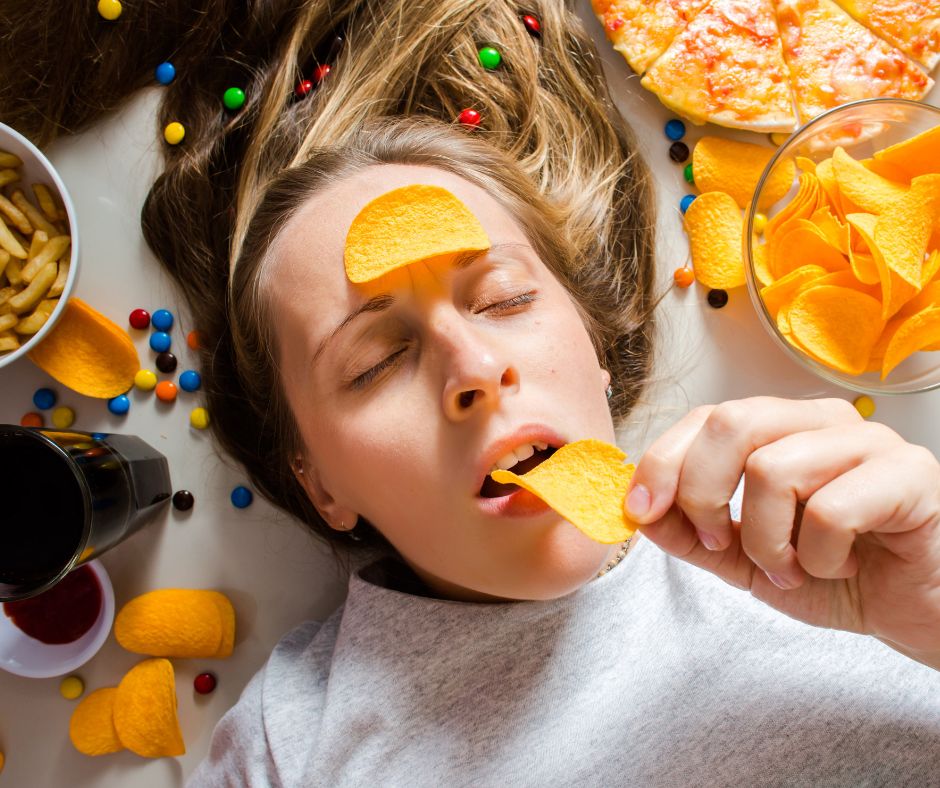Can foods affect anxiety? The answer is simple, yes!
But how does the food we eat affect anxiety? And what foods should we avoid to prevent a build up of anxiety and stress in our daily lives.
We’ve all heard the amazing benefits of tools like therapy, mindfulness, and of course exercise. If you haven’t then check out our prevention resources.

Food anxiety symptoms can include blood sugar spikes, fatigue, insomnia, a sense of feeling ‘on edge’ or overly anxious, brain fog and difficulty concentrating, nausea and headaches.
Let’s take a closer look at the negative effects diet can play when it comes to anxiety and panic attacks.
What drinks make anxiety worse?
Many foods and beverages that we consume have a huge effect on how we feel and our overall health.
Beverages that cause anxiety and panic attacks are mostly the common culprits. Yes, coffee is unfortunately one that affects most of us. An estimated 75% of the US population above the age of 20 years old reportedly drink coffee. 49% reportedly drink coffee daily.
Consuming high levels of caffeine increases nervousness and anxiety, decreases the production of the feel-good chemical in our body called serotonin, and often causes sleeplessness.
Decaffeinated coffee is a great alternative to regular coffee. Since caffeine is what you should be avoiding, you can still enjoy your favorite brew without the negative side effects.
Don’t be fooled, a lot of other beverages like tea and even hot chocolate contain caffeine.
When feeling anxious or depressed people often turn to beverages like energy drinks to give them a little added ‘kick’ to get through their day. Energy drinks are packed with caffeine too and have loads of sugar and artificial sweeteners. One sneaky ingredient to look out for that is often overlooked is guarana. It contains among the highest concentrations of caffeine than any other plant.
What foods to avoid if you have anxiety
Foods that trigger anxiety and should be avoided are foods that cause blood sugar spikes. Some examples of these foods are chocolate, cake, cookies, pies, soda, and candy.
Another common food to avoid is processed foods. These are often the most difficult to cut out of one’s diet since so many of our day-to-day meals contain preservatives. Foods like, bread, cheese, breakfast cereals, crisps, microwave meals, sweets, cookies, and soft drinks.
Can dairy cause anxiety?
High-fat dairy products, including cream and ice cream, have been associated with increased anxiety, stress, depression, anxiety, poorer memory functioning, and general ill-health.
Can sugar cause anxiety and panic attacks?
It is virtually impossible to cut sugar out of your diet. Natural sugar is found in fruits and vegetables. These are healthy in moderation and are required for a balanced diet. However, the sugar that we need to look out for is the sneaky added sugar.
Added sugar and high sugar foods can cause sugar spikes or glycemic highs and lows. These closely mirror symptoms of mental health issues, such as anxiety, irritability, and worry.

We all know about the added sugar offenders, but it is important to note the added sugar in foods that one wouldn’t necessarily expect.
That’s right, condiments like ketchup, some salad dressings, breakfast cereals, and pasta sauces have sugar added to them.
Other examples of foods that cause anxiety and panic attacks are refined carbohydrates and refined sugars.
Refined grains and sugars are the two main types of refined carbs. Common examples of refined carbs are foods like white flour, white bread, white rice, pasta, processed meals, and snacks.
Refined sugars come from plants such as sugar beets, sugar cane, and agave succulents. These are different from natural sugars found in fruit and dairy. Common examples of refined sugar foods include high fructose corn syrup, table sugar (sucrose), and agave syrup.
Does spicy food affect anxiety?
Spicy foods and foods like chilies contain high levels of vitamin B, niacin, vitamins, and minerals which are known to help reduce stress. Chilies can also boost the body’s production of serotonin (the feel-good hormone) which helps reduce anxiety and calms nerves.
Do eggs increase anxiety?
Whole eggs are packed with minerals, vitamins, amino acids, antioxidants, and tryptophan that are required for healthy stress response, and assist with creating serotonin.
Why is serotonin important for stress and anxiety?
As mentioned, serotonin is the body’s feel-good hormone. It plays a role in many of the body’s functions including, mood, emotions, digestion, and appetite. It’s a precursor for melatonin, which helps regulate sleep-wake cycles.
Low serotonin is one of the factors that may contribute to depression. Besides being great for mental health, serotonin also improves bone health, digestion, and sleep.
For more information on foods that can assist with anxiety, take a look at these “Best diets for anxiety [List of foods to include]”.



